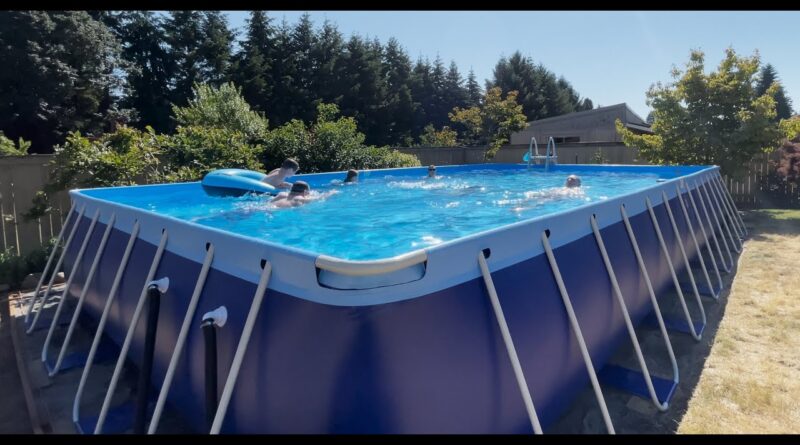Dive In: A Comprehensive Comparison of In-ground and Above-ground Pools
The dream of having a private swimming pool in your backyard is shared by many homeowners. It’s a symbol of relaxation, entertainment, and endless summer fun. However, when it comes to choosing the right pool for your home, you’ll face a fundamental decision: in-ground or above-ground? Each option offers its own set of advantages and considerations. In this article, we’ll take a deep dive into the world of pools, exploring the pros, cons, and everything in between to help you make an informed choice that suits your lifestyle and budget. To ensure the successful realization of your dream pool, consider seeking guidance from expert swimming pool contractors who can provide valuable insights and professional assistance throughout the decision-making and installation process.
Fun Fact: The world’s largest swimming pool is located in Algarrobo, Chile, and covers an astonishing 1,013 meters (3,323 feet) in length, holding a whopping 66 million gallons of seawater.
In-ground Pools: The Ultimate Luxury
In-ground pools are often associated with luxury and offer numerous benefits for homeowners who are willing to invest in their backyard oasis.
Pros of In-ground Pools:
Aesthetics:In-ground pools provide a seamless and integrated look with your landscape. They can be customized to fit your design preferences, incorporating various shapes, finishes, and materials like tile, stone, or concrete. If you’re considering the installation or renovation of an in-ground pool and want expert guidance to ensure a seamless integration with your landscape, explore the services offered by Fort Collins Handyman at https://fortcollinshandyman.net/. Their experienced team can assist you in creating a customized and visually appealing in-ground pool that complements the overall aesthetic of your outdoor space.
Property Value: A well-designed and well-maintained in-ground pool can significantly increase your property’s value. It’s a desirable feature for potential buyers and can make your home stand out in the real estate market.
Depth and Size Options: In-ground pools offer greater flexibility in terms of depth and size. You can have a shallow end for lounging and a deep end for diving, catering to various activities and preferences.
Durability: When constructed properly, in-ground pools are built to last. They are less susceptible to wear and tear caused by weather and UV exposure compared to above-ground pools.
Landscaping Opportunities: The surrounding area of an in-ground pool can be beautifully landscaped with gardens, patios, and outdoor living spaces, creating a complete outdoor retreat.
Cons of In-ground Pools:
Cost: In-ground pools come with a substantial initial investment. The construction costs include excavation, materials, labor, and permits. Ongoing maintenance expenses, including water and energy bills, can also add up.
Construction Time: Installing an in-ground pool is a time-consuming process. It can take several weeks, or even months, from excavation to completion, which may disrupt your outdoor living.
Maintenance: While they are durable, in-ground pools require regular maintenance, including cleaning, chemical balancing, and occasional repairs. These tasks can be time-consuming and may require professional assistance.
Safety Concerns: In-ground pools can pose safety risks, especially for families with young children. Proper fencing, alarms, and covers are essential to ensure safety.
Above-ground Pools: Affordable and Accessible
Above-ground pools have gained popularity for their affordability, ease of installation, and versatility.
Pros of Above-ground Pools:
Affordability: Above-ground pools are a budget-friendly option, making it more accessible for homeowners who want a swimming pool without breaking the bank. The initial cost, including installation, is considerably lower than in-ground pools.
Quick Installation: Above-ground pools can be installed relatively quickly, often within a few days. This means you can start enjoying your pool sooner.
Portability: If you ever decide to move, you can disassemble and relocate your above-ground pool, making it a more flexible choice for homeowners who may not stay in one place for long.
Minimal Maintenance: Maintaining above-ground pools is generally simpler and less time-consuming than in-ground pools. The smaller water volume requires fewer chemicals and less energy for filtration.
Safety: Above-ground pools are typically safer for young children, as they can be equipped with removable ladders and covers to restrict access.
Cons of Above-ground Pools:
Aesthetic Limitations: Above-ground pools may not blend seamlessly with your landscaping and outdoor environment. Their appearance is more utilitarian and less integrated compared to in-ground pools.
Limited Depth and Size: These pools have limited depth and size options compared to in-ground pools, which can restrict certain activities like diving.
Durability: While they are generally less susceptible to weather-related damage, above-ground pools have a shorter lifespan than in-ground pools and may require replacement sooner.
Reduced Property Value: While above-ground pools can be enjoyable, they may not have the same impact on your property’s value as an in-ground pool. Some potential buyers may view them as temporary or less desirable.
Maintenance and Operating Costs: The Realities of Pool Ownership
Regardless of the type of pool you choose, all pools come with maintenance and operating costs. Here’s what to consider:
Water Quality: Regular water testing and chemical balancing are essential for both types of pools to ensure safe and clean swimming conditions.
Filtration and Pumping: Pools require filtration systems to remove debris and contaminants. The size and efficiency of these systems impact energy consumption.
Heating and Energy Costs: Heating options, such as solar heaters or gas heaters, can significantly impact energy costs, particularly for in-ground pools.
Cleaning and Maintenance: Routine cleaning, including skimming, vacuuming, and scrubbing, is necessary to keep your pool in good condition.
Repair and Replacement: Both in-ground and above-ground pools may require occasional repairs or component replacements, such as liners, pumps, or filters.
Final Considerations: Lifestyle and Preferences
Ultimately, the choice between an in-ground and above-ground pool depends on your lifestyle, preferences, and budget. Here are some final considerations:
Intended Use: How do you plan to use your pool? If it’s primarily for relaxation and occasional recreation, an above-ground pool may suffice. If you have a passion for swimming or water sports, an in-ground pool may be a better fit.
Long-Term Commitment: Consider how long you plan to stay in your current home. If it’s a short-term residence, an above-ground pool’s portability may be advantageous.
Budget Allocation: Assess your budget for both the initial installation and long-term maintenance. Remember that ongoing operating costs can add up.
Aesthetics and Property Value: Think about the visual impact on your property and how it may affect its resale value.
Safety: If you have young children or safety is a top priority, explore safety measures for both pool types.
The choice between an in-ground and above-ground pool is a significant decision that involves multiple factors, including aesthetics, cost, maintenance, and lifestyle. Both options offer the opportunity to create enjoyable outdoor spaces for family and friends. By carefully considering your priorities and budget, you can make an informed choice that transforms your backyard into a refreshing oasis for years to come. Whether you opt for the luxury of an in-ground pool or the affordability of an above-ground pool, the ultimate goal is to create a space where you can relax, cool off, and make lasting memories.




